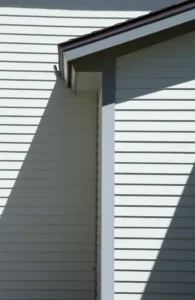If you are currently researching what type of replacement siding you need, you are likely thinking about the style, color and aesthetics of your siding. And while aesthetics are indeed important, what holds greater importance is how energy efficient the siding is.
We all know siding is one of the first things people see when looking at your home, so of course, you want it to be something that reflects your style. However, siding has a much more important function and that is to protect your home from the elements. Furthermore, it should be able to do so without you having to crank up the heating or cooling in your home as the seasons and weather change throughout the year. And, with reducing carbon emissions more important than ever, the more energy-efficient your siding is, the better for the environment and the better for your wallet.
So, which siding is best for increasing energy efficiency? There are several different types of home siding that are marketed as energy-efficient, but when it comes to energy-efficient siding, not all are equal. You also must take into account things like maintenance, durability, and insulation to determine which siding truly is the most energy-efficient.
In this article, we will be offering an insight into the energy efficiency of common replacement siding materials so you can determine which is the right fit for your home and needs. We will specifically be looking at vinyl siding, wood siding and fiber cement siding.
All About Vinyl Siding
Vinyl siding is one of the most popular siding choices for homes in Maryland and Virginia. This is because vinyl siding is known for its ability to withstand harsh elements, and it can almost perfectly mimic the look of many types of cladding including stone, wood and slate, (for a fraction of the cost). Vinyl siding is the ideal siding choice if you want to increase the energy efficiency of your home, as it can be paired with insulated siding, which is a foam that adds another layer of insulation to your home.
Advantages of Vinyl Siding
- Durable and resistant to harsh weather
- Widely available
- Cost-effective
- Eco-friendly
Disadvantages of Vinyl Siding
- Cannot be painted once installed
- Repairs require replacement of entire sections
- Style/color selection is not as extensive as other types of siding
All About Wood Siding
Wood siding (also known as cedar or cedar wood siding) is an incredibly popular siding choice. Cedar siding has a great-looking exterior, offers excellent protection from the elements and it is extremely durable and resistant to weather. Cedar wood is also great for the environment as it is biodegradable and requires minimal processing and treatment. It is also a great insulator, preventing the loss of warm air during winter and keeping the cool air inside during summer. It also protects the structure of your home from excessive heat, water and dryness. The only downside to wood siding is it can be quite costly, as well as being an attractive material to termites.
Advantages of Wood Siding
- Excellent insulator
- Eco-friendly
- Attractive finish
- Can be easily replaced
- Durable and resistant to harsh weather
Disadvantages of Wood Siding
- Can be costly
- Requires regular maintenance (staining/re-painting)
- Termites can be a big problem if the wood is not maintained
All About Fiber Cement Siding
Fiber cement is made of wood fibers that have been mixed with sand and cement. It is thicker than other siding and has the ability to withstand extreme weather such as strong wind and hail. It also does not require refreshing as often as wood siding as the paint lasts longer from the time of installation. If durability and little maintenance is important to you, fiber cement has a good reputation for its quality and ability to last over time with little work done to it. Like wood siding, it can be a more expensive material to buy and install.
Advantages of fiber cement siding
- Not susceptible to termites
- Water resistant
- Incombustible
- Many options for texture and colour
Disadvantages of fiber cement siding
- Installation can be more complicated as the material is very heavy
- Costlier than other types of siding
For the Most Energy-Efficient Siding, Choose Insulated Siding
What is Insulated Siding?
If you are searching for the most energy-efficient siding on the market, you will want to choose insulated vinyl siding. Insulated vinyl siding is a special material that combines the benefits of exterior siding with the addition of an extra layer to the back of the material. Most commonly, insulation is added to vinyl siding rather than other types of siding. There are many types of insulation, but the most common option is an insulation that offers a foam core underneath the exterior material.
The Benefits of Insulated Siding
You might be thinking: “aren’t the walls of my home already insulated?” The truth is yes, most homes already have insulation in the walls. The reality is that any type of insulation creates a ‘blanket’ over your home. The more insulation you add, the more ‘blanket layers’ you are adding. As such, this helps further trap the air inside your home and minimizes the amount of air that enters your home. This can make your home far more energy-efficient and make a significant difference to your utility bills.
In Conclusion
For the most energy-efficient siding, choose insulated vinyl siding. Not only is it durable and resistant to harsh weather, it is also cost-effective, eco-friendly and widely available.
{{cta(‘c2473634-2347-48b2-a01d-b65b501f4383′,’justifycenter’)}}



